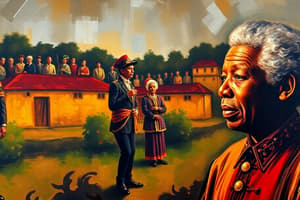Podcast
Questions and Answers
What does the name 'Nomgqibelo Ncamisile Mnqhibisa' represent in the poem?
What does the name 'Nomgqibelo Ncamisile Mnqhibisa' represent in the poem?
- A beautifully meaningful heritage (correct)
- A common name in South Africa
- A name of a hero from history
- A random name lost in time
What is the primary issue the speaker faces regarding their name?
What is the primary issue the speaker faces regarding their name?
- The name is often changed to a European one (correct)
- The name is difficult to pronounce
- The name does not have historical significance
- The name is too long for official documents
Which system is referred to as 'apartheid'?
Which system is referred to as 'apartheid'?
- A social program for education in South Africa
- A government system of racial segregation (correct)
- A system promoting equal rights for all citizens
- A law governing the economy of South Africa
What did the main character in 'The Secret Language' do to prepare for the 'fair stranger'?
What did the main character in 'The Secret Language' do to prepare for the 'fair stranger'?
What cultural practice regarding body exposure was changed under colonial rule?
What cultural practice regarding body exposure was changed under colonial rule?
What does the reference to a 'burly bureaucrat' suggest about the speaker's interaction?
What does the reference to a 'burly bureaucrat' suggest about the speaker's interaction?
How did many black South Africans manage their identities during apartheid?
How did many black South Africans manage their identities during apartheid?
What does the color of the teacher's hair symbolize in 'The Secret Language'?
What does the color of the teacher's hair symbolize in 'The Secret Language'?
What does the main character's new name, Christina, signify in the context of her identity change?
What does the main character's new name, Christina, signify in the context of her identity change?
What is highlighted as the main character's culinary talent in the fifth stanza?
What is highlighted as the main character's culinary talent in the fifth stanza?
What reflects the emotional struggle of the main character regarding her identity?
What reflects the emotional struggle of the main character regarding her identity?
What does the commission represent in the story 'Gentlemen of the Jungle'?
What does the commission represent in the story 'Gentlemen of the Jungle'?
What is the outcome of the first commission's decision regarding the hut?
What is the outcome of the first commission's decision regarding the hut?
What character trait does the lion exhibit by calling a commission to settle the dispute?
What character trait does the lion exhibit by calling a commission to settle the dispute?
What does the elephant's claim that the man has 'harder skin' illustrate about their argument?
What does the elephant's claim that the man has 'harder skin' illustrate about their argument?
Which of the following best explains Binaay's experience with the American education system?
Which of the following best explains Binaay's experience with the American education system?
Flashcards are hidden until you start studying
Study Notes
My Name by: Magoleng wa Selepe
- The poem explores the impact of Apartheid on personal identity, specifically through the experience of having one’s name distorted.
- It highlights the power dynamics between a Black South African and a white bureaucrat as "Nomgqibelo Ncamisile Mnqhibisa" is reduced to "Maria."
- The poem reflects the reality of many Black South Africans during apartheid, who often held two names: one in their native language and another, European name used by their employers.
- This reflects the system's attempt to erase cultural heritage and impose a European identity.
- Apartheid was a system of racial segregation enforced in South Africa for 50 years.
- It involved the enactment of 148 laws that enforced racial separation and discrimination.
- One of the key aspects of Apartheid was the banning of interracial marriages.
The Secret Language
- This poem explores the theme of assimilation and the challenges faced by individuals trying to navigate different cultural identities.
- The speaker learns English for a "fair stranger," suggesting assimilation into a dominant white culture.
- The speaker’s act of braiding her hair "thick and beautiful as the serpent in the story of Eden" signifies a desire to conform to European beauty standards.
- The speaker hides her breasts and surrenders her beads, reflecting the imposed cultural norms of the colonial era.
- Before colonization, the exposure of breasts in many African cultures was not seen as inherently sexual, but rather as a part of motherhood and nurturing.
- This illustrates the suppression of indigenous practices and the imposition of European standards under colonial rule.
- The speaker’s name change from "Binaay" to "Christina" exemplifies the erasure of cultural identity during colonialism. The teacher's hair being the "color of corn" hints at the white teachers and reinforces the colonial influence on education.
- The speaker is praised for her lemon pie and her English, highlighting the recognition of her assimilation but potentially highlighting a loss of her own traditions.
- The final stanza expresses the speaker's internal conflict and longing for her lost identity.
- The poem reflects the complex and often painful process of assimilation, where individuals are pressured to abandon their own cultural heritage and embrace a foreign one.
Gentlemen of the Jungle by: Jomo Kenyatta
- This fable illustrates the unfairness of colonialism and the exploitation of indigenous people.
- The man is initially seen as equal to the elephant, but this is quickly dismissed when the man's attempts to assert his rights are ignored.
- The Lion, representing the colonial power, establishes a Commission to seemingly resolve the dispute. However, the commission is made up of animals, symbolizing the lack of representation and fairness for the man, who is the “human” voice.
- The man's requests are ignored, highlighting the power imbalance and the unjust nature of the colonial system.
- The elephant and rhinoceros, representing the colonial powers, repeatedly take over the man's hut, reflecting the systemic dispossession and exploitation of indigenous people.
- This fable critiques the hypocrisy of colonial justice systems that prioritize the interests of the colonizers over the rights of the colonized.
- Kenyatta’s work effectively highlights the exploitation and marginalization faced by indigenous people during the colonial period.
Studying That Suits You
Use AI to generate personalized quizzes and flashcards to suit your learning preferences.




